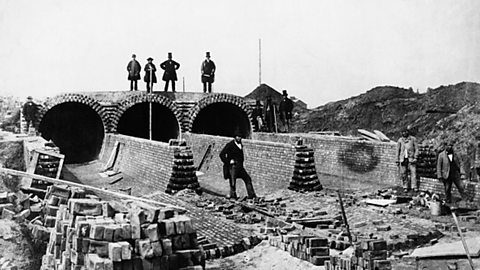Changes in the prevention of disease - improving public health
There were several changes in the late 19th century, many led by the government, that improved the health of the British public.
Edwin Chadwick and the 1848 Public Health Act
In 1842, a government official called Edwin Chadwick published his Report on the Sanitary Conditions of the Labouring Population. He carried out detailed research that showed people living in cities had a much lower life expectancyThe average number of years a person is expected to live depending on where they live. than people living in the countryside. Chadwick concluded that this was down to dirty and difficult living conditions. He recommended better supplies of clean water and more regular removal of waste.
The government did not intervene immediately. However, in 1848, they passed the first Public Health Act. This law encouraged cities in England and Wales to set up boards of health and provide clean water. However, it had little impact because at this point the measures were still optional and expensive.
Joseph Bazalgette and the вҖҳGreat StinkвҖҷ
In 1858, London experienced a very hot summer. This led to the smell from the River Thames, where human waste ended up, getting worse and worse. This became known as the вҖҳGreat StinkвҖҷ. The River Thames is next to the Houses of Parliament and the smell got so bad that Members of Parliament could smell it for themselves!
As a result, the government acted. Joseph Bazalgette, an engineer, was employed to build a network of sewers under the streets of London. By 1866, most of London was connected to the new sewerage systemA series of underground pipes that take away waste water to be cleaned and re-used. It removed waste from where people lived and therefore reduced the risk and potential spread of choleraA bacterial infection caused by contaminated drinking water.

1875 Public Health Act
In 1875, the government passed a second Public Health Act. This made it compulsoryRequired by law or rule. for local councils to:
- improve sewers and the removal of waste
- provide clean water
- appoint medical officers to inspect public health facilities
This was a huge breakthrough in public health. The government was finally taking responsibility for the health of the British people. The main reasons for this were:
- Louis Pasteur had proven that there was a link between dirt and disease with his germ theory.
- Once the scientific cause of disease and illness had been proven, people were more willing to pay taxes that would fund better living conditions.
- In 1867, working men were given the right to vote. Political parties needed their support if they were going to win elections, so addressing problems in the cities was important to attract supporters.
Vaccination programmes
By the late 19th century, the government was more willing to consider programmes of vaccination. The work of Edward Jenner, Louis Pasteur and Robert Koch had convinced them that vaccination programmes could be successful. During this period, diseases targeted by vaccination programmes included rabies and typhoid.